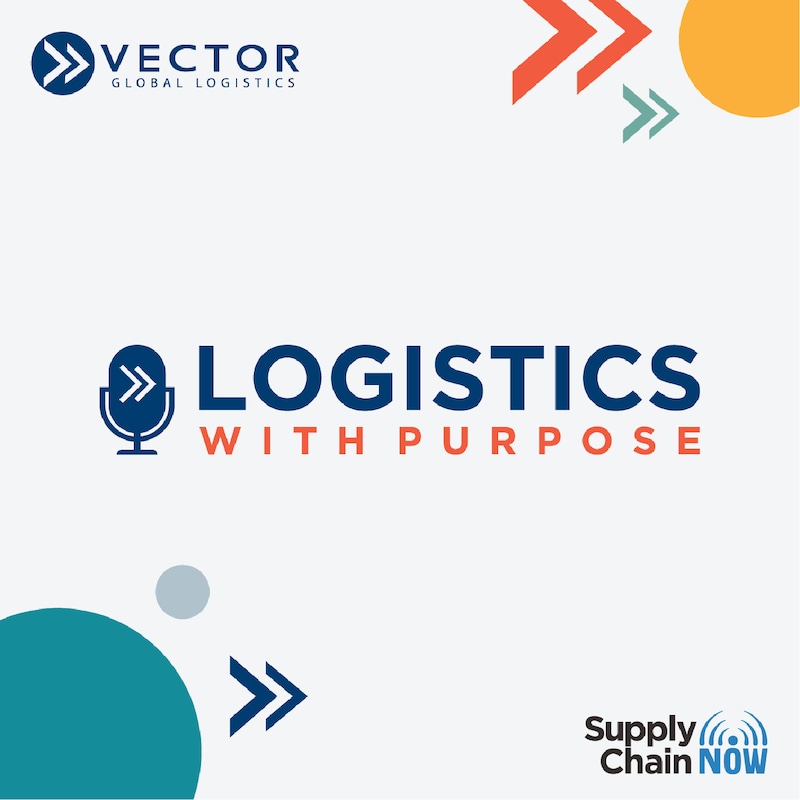
Empowering Women: Investing with Purpose and Passion
Episode 149 •
12th February 2026 • Logistics with Purpose • Supply Chain Now
00:00:00
00:48:31
More Episodes
146.
Logistics with Purpose™ Classic: Generous Leadership in Action: Insights from Joe Davis on Feedback, Vulnerability, and Inclusivity
00:46:14
133.
Logistics with Purpose® Classic: A Renewed American Dream- Closing the Racial Wealth Gap feat. Ying McGuire, NMSDC
00:45:55
129.
The Importance of Mental Wellness in the Supply Chain & Logistics Industry Featuring Alan Barron with Aon
00:32:27
126.
The Future of Purpose-Driven Business: Insights from B Lab U.S. & Canada's Jorge Fontanez
00:40:49
124.
Building a Business with Heart: How Jordi Ricart and Curated Prioritize Purpose Over Profit
00:51:33
120.
Logistics with Purpose Classic- Humanitarian Logistics: Empathy in Action featuring Christelle Delenclos with Maersk Project Logistics
00:44:44
117.
From Earth to Space: How Space for Humanity and Aisha Said are Democratizing Space Travel
00:37:18
113.
Generous Leadership in Action: Insights from Joe Davis on Feedback, Vulnerability, and Inclusivity
00:46:14
111.
Logistics with Purpose Classic: Leading a Revolution by Paying a Dollar a Pound with Paul Rice, Founder and CEO, Fair Trade USA
00:43:26
109.
Logistics with Purpose Classic: Reinventing Emergency Disaster Relief feat. David Burke from Team Rubicon
00:42:43
108.
Chocolate and Family: The Recipe of Success ft. Elaine Read and Matt Weyandt with Xocolatl Small Batch Chocolate
01:06:53
107.
Logistics with Purpose Classic: You Can’t Learn a New Trick If You’re Not Willing to Fall with Supergoop! CEO Amanda Baldwin
00:47:06
106.
From Industry to Impact: Tackling Global Challenges with Strategic Design featuring Paulina Garza Gordoa
00:32:16
101.
Saving Goals and Changing Lives: Hope Solo's Journey from Soccer Star to Social Advocate
00:44:51
96.
Sustainable Innovation and Beyond: Atul Vir's Trailblazing Odyssey in International Entrepreneurship
00:45:02
94.
Humanitarian Logistics: Empathy in Action featuring Christelle Delenclos with Maersk Project Logistics
00:44:44
92.
Logistics with Purpose Classic: Distributing the Gift of Giving at Scale with Jenise Steverdin
00:46:13
87.
Autonomy Plus Accountability Equals Results with Jody Thompson, Founder and CEO of CultureRx
01:01:07
83.
Getting Goods in the Hands of the Right Partners featuring Ben Grossman, Founder of SwagCycle
00:48:03
77.
Leading a Revolution by Paying a Dollar a Pound with Paul Rice, Founder and CEO, Fair Trade USA
00:43:26
76.
Embracing a Clean Shipping Obsession with Danielle Southcott, CEO and Founder of Veer Group
00:37:25
75.
Making the World Smarter, Happier & Richer with David Gardner, Chief Rule Breaker at The Motley Fool
01:01:09
73.
Giving the Gift of Mind-blowing Science with Tzipor Ulman, CEO of Science is Elementary
00:59:07
72.
You Can’t Learn a New Trick If You’re Not Willing to Fail with Supergoop! CEO Amanda Baldwin
00:47:06
68.
Great for the Environment, Better for the Bottom Line: Decarbonizing the Last Mile with BrightDrop
00:46:25
67.
Custodians of Culture: Recovering & Rerouting Missing Art with Monuments Men's Anna Bottinelli
00:58:45
66.
Supply Chain Now Crossover: Love Unconditionally, Serve Equitably- How to Deliver Relief that Lasts with ALAN's Kathy Fulton
00:46:55
65.
The Logistics of Leadership & Making a Difference with Hapag-Lloyd's Christopher Hussaini
00:36:15
63.
Everything Starts at Home: Manufacturing Opportunity with Mākhers Studio Founder Wanona Satcher
01:10:49
62.
Lighting Up the World & Eradicating Energy Poverty with SolarBuddy Founder & CEO Simon Doble
00:54:47
61.
Logistics with Purpose Classic: Putting Social Responsibility & Sustainability First: Bob Dalton with Sackcloth & Ashes
01:00:22
59.
What Talent Shortage? How to Connect to the Refugee Workforce with Chris Chancey and Harris Amani
01:21:27
57.
Helping Startups Get Started: Social Entrepreneurship with Plywood People's Jeff Shinabarger
00:50:18
56.
The Power of the Network: Forwarding Freight and Delivering Relief with WCAworld CEO Dan March
01:01:15
55.
Gearing Up to Eradicate Poverty & Trekking Toward Purpose With Cotopaxi Founder Davis Smith
00:45:11
54.
Transforming Healthcare by the Shipment With Liberia Medical Relief Founder Dr. Kevin Strathy
00:33:05
49.
Acting on Sole Purpose: Delivering Dignity and Agency with Soles4Souls CEO Buddy Teaster
00:49:56
47.
Logistics with Purpose Classic: How to Heal the World One Donation at a Time With MAP International CEO Steven Stirling
00:57:48
38.
Shipping the Gift of Mobility: The Logistics of Pedals for Progress with Founder David Schweidenback
01:04:01
37.
Changing Lives Through Kindness: A Conversation with Ryan Grabill and Audra Weddle of Convoy of Hope
00:57:06
36.
Orphan Prevention and Family Preservation Through Empowering Women: Ashley Bohinc & Henok Berhanu with Carry 117
01:10:18
33.
One Night Only: Join Us as MAP International Honors Dr. Anthony Fauci and Healthcare Heroes
00:59:44
31.
Putting Social Responsibility & Sustainability First: Bob Dalton with Sackcloth & Ashes
01:00:22
30.
How to Keep Doctors Without Borders Well-Supported: Lessons in Global Logistics from Diego Flores
01:07:56
29.
Creating Opportunities for Others to Succeed: Leadership Lessons from Hon. Emmanuel Armah Kofi Buah
01:00:26
27.
Leading a Non-Profit Through the Pandemic: Essential Lessons From Books For Africa’s Pat Plonski
00:55:04
26.
Surplus Medical Supplies Meets Sustainability: MedShare's Purpose is Rooted in Repurposing
00:49:56
25.
"Until you get punched in the face”: Delivering good(s) in times of disruption with Good360
00:46:56
23.
Hand-Washing Goes Mobile: Delivering Empathy in a Crisis with Love Beyond Walls’ Terence Lester
00:42:39




